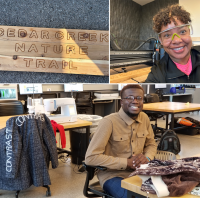What do a Girl Scout mom from Lee’s Summit, Missouri, and a clothes designer from Olathe, Kansas, have in common? They have both found the Black & Veatch MakerSpace at the Library’s Central Resource location to be an invaluable resource.
Rashel Hughley etched a wood trailhead sign using the computer-controlled engraver (known as a CNC router) to help her daughter’s second-grade troop with a service project. Samuel Landu routinely uses the vinyl cutter and heat press to imprint his high-fashion streetwear with custom designs or variations of his company’s logo.
Hughley discovered the MakerSpace while working as a consultant for the Library. Her troop co-leader also knew about it as an employee of Black & Veatch.
Hughley’s Girl Scouts could see from their school’s playground that the sign marking the beginning of the Cedar Creek Trail was falling apart, and the troop members resolved to replace it. The marker had horizontal two-by-fours attached to larger wooden pillars.
“And so we knew how we wanted to put it together,” Hughley said, “but we were stuck on how to get the wording on there.”
That’s when Hughley remembered the MakerSpace and its CNC router, which proved to be the perfect tool to carve in the trail name and mark the new sign as the handiwork of the troop. The girls helped with assembly and added their touch to the site with rocks painted with butterflies, flowers and encouraging words.
The girls were thrilled to be featured in the school newsletter and to get a thank-you from the principal.
Hughley also amazed her father, who did a similar project many years ago for her brother’s Boy Scout troop. She finished her work in about 90 minutes while he labored manually.
“He just traced his letters onto the board and then got his hand router and went over the lines,” Hughley said. “No human is going to be as steady as a computer or a robot, so even with his best effort, it still wasn't as crisp as the CNC router, and it definitely took way longer.”
Landu can measure his progress at the MakerSpace in less than a minute. He can perfect his design on the computer in a matter of seconds, and it takes only a brief moment to affix the logo.
On a visit to the MakerSpace last month, he demonstrated his process. It took a couple of tries on the computer to get the right alignment — “It’s all about the starting point,” he said — and Landu then used a “weeding” tool to trim excess vinyl from the print.
Then he took a few steps to the heat press, which was at the perfect temperature of 276 degrees.
“Here we go — I’ve got it set at 11 seconds,” he explained. The machine beeped and Landu ticked off the last couple of seconds. “Let’s take a look,” he said. “Perfect. And it puffs right out.”
Landu’s mother is a seamstress who is originally from Congo, so he has been tinkering with fabric and design since his teens. He named his clothing company Contrast AFR to highlight its fusion of African and American culture.
Landu tried his hand in the music business for a little while after high school, but he moved back to Kansas City from Los Angeles about four years ago. That’s when he started using the MakerSpace to focus on his clothing business.
Landu said he enjoyed experimenting with the different equipment in the MakerSpace, and he embraced the atmosphere.
“It's just a hub where you can curate ideas and there's so many different things that you can do,” he said. “You meet so many different people, so it's an amazing experience.”
The variety of patrons is also what energizes Thomas Maillioux, one of the three MakerSpace facilitators. The space serves people of all ages, they said, and with interests that range from art to inventing and medical technology.
Working with technology is interesting, but Maillioux said the job “could get repetitive if it was just about the equipment.”
Helping the patrons is what brings meaning to the job, Maillioux said.
“Rashel and Sam are both good examples of that,” they said. “We are here to support them, and thanks to what we are offering, they can take their craft to new heights.”

